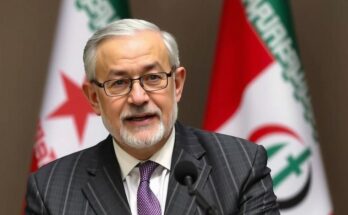The United States is not currently pursuing a revival of the ceasefire agreement between Israel and Hezbollah after Israel rejected a US-led proposal. The focus has shifted to managing military operations rather than halting hostilities, amidst significant casualties and displacements in Lebanon. Despite efforts to negotiate a ceasefire, US influence appears limited, with growing concerns about potential escalation into a larger conflict following Israeli military actions.
The United States is currently not making efforts to revive a ceasefire agreement between Israel and Hezbollah, following Israel’s rejection of a US-supported proposal. US officials have indicated that the focus has shifted to managing Israeli military actions rather than preventing hostilities in Lebanon, where ongoing airstrikes and ground operations have resulted in significant casualties and displacements. Over 1,400 individuals have reportedly lost their lives in less than three weeks, with over one million displaced by the conflict. This escalation raises concerns regarding the potential for a broader conflict as Israeli operations intensify, despite previous assurances of limited military engagement. The US initially sought a ceasefire that would halt the violence for 21 days to facilitate diplomatic measures aimed at returning civilians to their homes in northern Israel and southern Lebanon. However, acknowledgment within the Biden administration has grown that their influence over Israel’s military strategies is quite restricted. “We couldn’t stop them from taking action, but we can at least try to shape what it looks like,” a senior US official indicated, emphasizing the political complexities involved. Despite the limited leverage, the United States aims to continue negotiations for a ceasefire, as underscored by public statements from administration officials, including White House Press Secretary Karine Jean-Pierre. However, there are uncertainties regarding the parties involved in such discussions, particularly following the death of key Hezbollah leaders and the ongoing power vacuum in Lebanon’s government, which affects its ability to engage meaningfully in peace talks. Furthermore, tensions remain high concerning Israel’s upcoming retaliatory actions against Iran following an attack that escalated regional fears of prolonged conflict. US officials have articulated the necessity for restraint in Israel’s response, recognizing the challenges posed by Israel’s differing perceptions of proportionality compared to global standards. As the situation evolves, US Defense Minister Yoav Gallant’s scheduled discussions with his US counterpart highlight ongoing diplomatic efforts to mitigate escalation. The situation is complicated further by operational conduct near civilian areas in Lebanon, including potential disruptions to the Beirut airport, which pose risks to American citizens in the region. As US officials continue to press for considerations regarding civilian safety amid Israeli operations, the prospect of meaningful negotiations remains tenuous, underscoring the urgent need for a sustainable resolution to the volatile situation in Lebanon.
The article discusses the current geopolitical context surrounding the ongoing conflict between Israel and Hezbollah, particularly in the aftermath of Israel’s military actions in Lebanon and the implications for US involvement. The background reveals that the US had previously attempted to broker a ceasefire between these factions but has since redirected its efforts towards shaping Israeli military operations rather than halting violence altogether. The complex dynamics include the historical context of US-Israel relations, the impact of recent military actions, and the broader implications for regional stability, all of which are heightened by the humanitarian crisis unfolding in Lebanon.
In conclusion, the United States has stepped back from actively pursuing a ceasefire between Israel and Hezbollah, shifting its focus towards shaping Israeli military strategies amidst escalating violence. With significant casualties and widespread displacements evident, there is increasing concern regarding the potential for a broader conflict. The complexities of diplomatic negotiations amidst regional instability, combined with the limited influence of the United States over Israeli actions, underscore the challenges ahead. Moving forward, the situation requires careful monitoring and dialogue to navigate towards a sustainable resolution in the region.
Original Source: www.cnn.com




